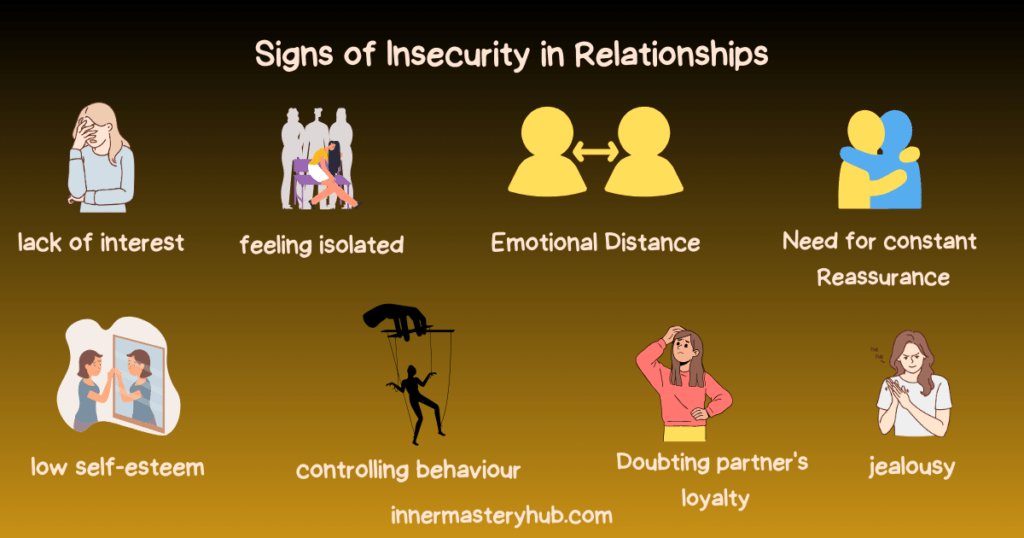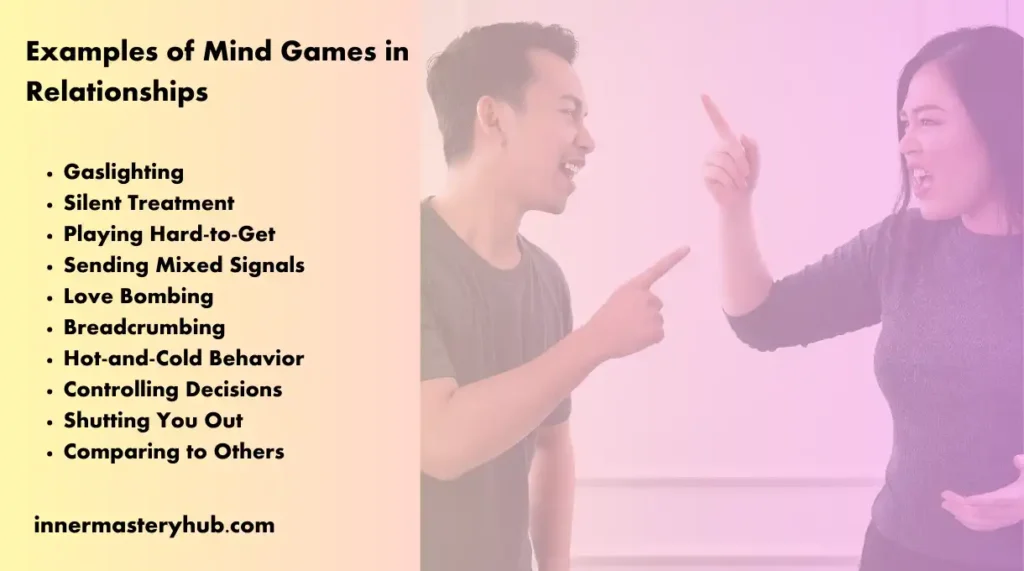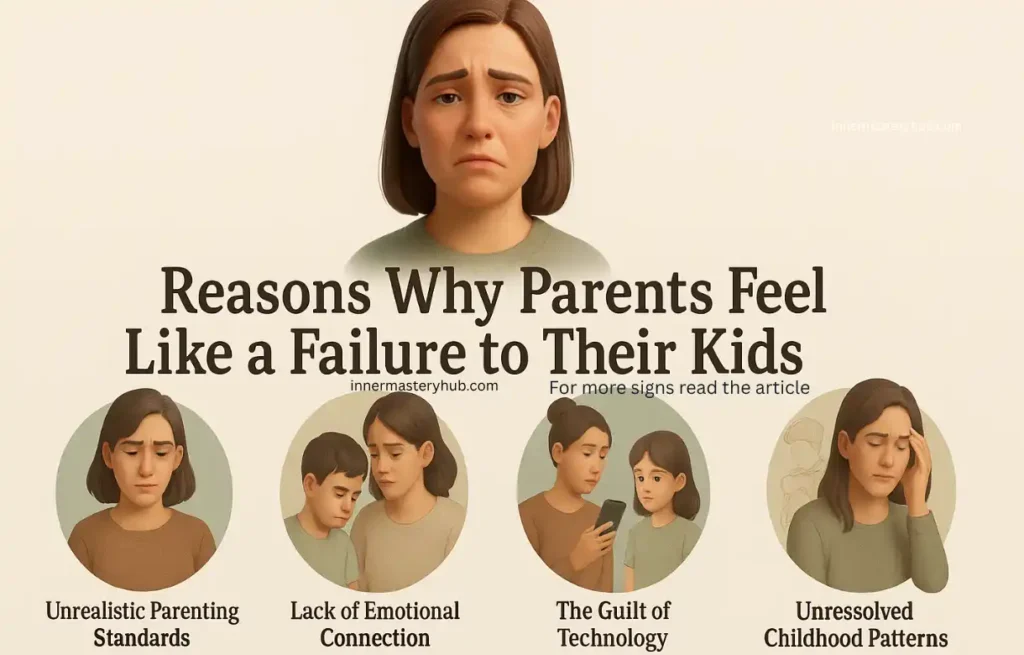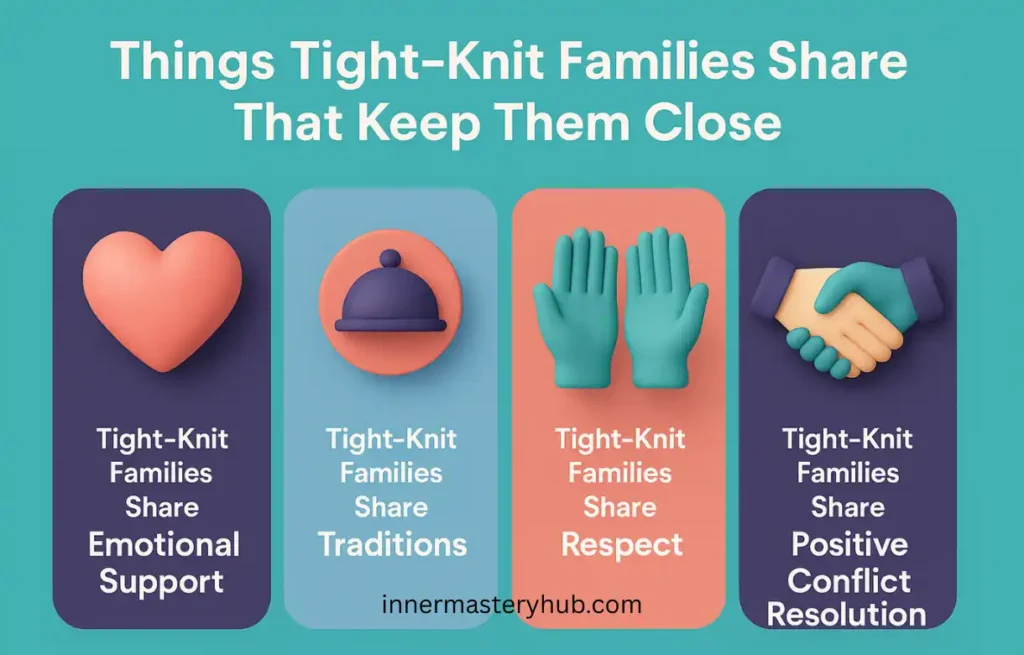10 Signs of Insecurity in Relationships You Shouldn’t Ignore
Insecurity in relationships happens when fear, doubt, or low self-worth affect how partners connect. It can lead to jealousy, overthinking, or emotional distance. Building trust, improving communication, and developing self-confidence help create stronger, healthier, and more secure relationships.

“Insecurity ruins relationships and causes most fights” — Olivia Wilde.
Insecurity in relationships can manifest in various ways. It may be unwarranted jealousy, a constant need for reassurance, or an obsession with perceived failures on the part of the partner.
You might find yourself doubting your partner’s feelings or making unfavorable comparisons to others. This can lead to possessive behavior or overanalyzing every interaction for signs of rejection. These insecurities can create a harmful cycle of self-doubt and fear, straining the relationship.
In this blog, we’ll explore the roots of Insecurity in relationships, its impact, and some strategies to manage these challenging feelings.
How Insecurity Can Show Up In Your Relationship: 10 Signs
Insecurity in relationships can manifest in various ways, affecting both partners. Here are some common signs and behaviors associated with your insecurities:
- Need for constant reassurance. Insecure people often seek constant validation from their partners to feel valued and loved.
- Fear of Rejection. They may constantly fear rejection and actively look for signs of it, even when there’s no evidence.
- Avoiding Emotional Intimacy. Individuals with Insecurity may struggle to form emotionally close relationships and often maintain a guarded demeanor.
- Immediate Defensiveness. They might become easily offended or hurt by something their partner asks, leading to immediate defensiveness.
- Jealousy and Insecurity in relationships can lead to envy, making partners feel threatened by others in their partner’s life.
- Lack of Personal Space. Insecure partners may struggle to give each other personal space, fearing that time apart could harm the relationship.
- Difficulty Handling Criticism. Individuals with low self-esteem may struggle to handle criticism and react defensively to any feedback.
- Unwarranted Distrust. They may struggle with their partners’ suspicions or doubts about their partner’s faithfulness.
- Negative Self-Image. This Insecurity stems from a negative self-image, where individuals believe they are not good enough for their partner.
- Communication Issues
Individuals with Insecurity may struggle to communicate openly and honestly with their partners, which can lead to misunderstandings and conflicts.
Why Do I Feel Insecure?
Insecurity is a complex emotional state that is influenced by various factors. The following examines the leading causes of Insecurity in people:
Lack of Self-Confidence
A lack of self-trust often leads to Insecurity. People may feel insecure in many areas of their lives when they question their skills or value.
Past Trauma
Having been bullied, mistreated, abused, or betrayed in the past might cause ingrained fears. It may be challenging to feel secure, as these experiences can negatively impact self-esteem and trust.
External Validation
Relationship insecurity can arise from relying on outside sources of self-worth, such as accomplishments, admiration, or praise. Insecure feelings of inadequacy may surface when external sources of validation are lacking or inconsistent.
Comparisons
Constantly comparing oneself to others can fuel Insecurity in relationships. Social comparisons often lead to unfavorable self-evaluations, making individuals feel less competent or attractive.
Uncertainty
Relationship insecurity can be exacerbated by constantly comparing oneself to other people. Social comparisons often lead to negative self-perceptions, which can diminish a person’s sense of competence or attractiveness.
Perceived Rejection
Insecurity and uncertainty about oneself or the future are closely related. Anxiety and self-doubt brought on by this uncertainty might impact one’s relationships and ambitions.
Negative Self-Image
Suffering from a negative self-perception might exacerbate emotions of Insecurity. Insecure feelings are more likely to arise in various contexts when people believe they are inadequate or unattractive.
Pressure to Conform
Social expectations to live up to ideals of success, behavior, or beauty can lead to Insecurity. The fear of falling short of these expectations might lead to self-doubt.
To address and overcome these sentiments, it is essential to comprehend these fundamental causes of Insecurity. Building self-confidence, seeking treatment to recover from past trauma, and discovering healthy ways to affirm oneself and cope with societal comparisons are common components.
Impact of Insecurity on Relationships
If Insecurity is left unaddressed, it can have a significant impact on relationships. It develops a negative feedback loop that can erode the foundation of respect and trust. This is how:
Erosion of Trust
Insecurity leads to mistrust and uncertainty, eroding your partner’s trust over time. The relationship becomes tense and uncomfortable due to this lack of confidence.
Communication Breakdown
Insecure people misinterpret their partner’s words and actions or look for criticism where none exists. This could damage the connection by leading to miscommunication and misunderstandings.
Reduced Emotional Intimacy
Insecurities prevent people from forming strong emotional attachments to their spouses, driven by an ongoing need for validation and fear of abandonment. This results in a lack of connection and decreased emotional intimacy.
Increased Conflict
Conflicts arise in relationships when Insecurity breeds jealousy, dominating tendencies, and baseless accusations. A relationship ends due to ongoing conflict, which also causes emotional suffering.
Decreased Self-Esteem
Self-esteem gets adversely affected by Insecurity. Their insecurities get exacerbated, and feelings of worthlessness result from ongoing self-doubt and anxiety about not being good enough. Additionally, this eventually affects the person’s mental health, resulting in anxiety and sadness.
Conflict and Emotional Distance
People who are insecure may be more likely to get into arguments because they are more sensitive to perceived dangers. As a result of their conflicts and disagreements, spouses experience emotional estrangement.
Projection
Occasionally, people transfer their fears onto their significant others. They could blame their partner for behaviors they fear, even if those fears are unjustified.
Ultimately, insecurity works like a self-fulfilling prophecy because your fear of losing your partner can cause you to behave defensively and drive them away.
— SABRINA ROMANOFF, PSYD
How to Overcome Insecurity in Relationships
Effective communication, self-reflection, and coordinated attempts to establish trust are all necessary to reduce insecurities. To help overcome the reasons why people feel uncomfortable in relationships, consider the following practical steps:
Self-Reflection
The first step in resolving your fear is to comprehend its underlying reasons. To identify patterns that have contributed to these emotions, revisit your previous interactions and experiences.
Identify your triggers
Developing self-awareness of what makes you feel insecure is vital to controlling these emotions. You can pinpoint areas that require improvement by keeping an eye on and documenting circumstances that cause Insecurity.
For instance, conversations about plans may disclose concerns about commitment. The objective is to understand triggers and develop plans for a safer, healthier connection.
Open Communication
You can reduce your insecurities by having frank, open conversations with your partner about them. Let your partner know how you feel and voice your worries without placing blame.
Build Trust
Activities that promote trust, such as sharing intimate stories and being vulnerable, can help you and your spouse connect on a deeper, more meaningful level. Building trust also involves exhibiting dependable, consistent behavior over time.
Positive Self-Talk
Positive affirmations should replace uneasy thoughts and self-critical remarks. This can lessen feelings of uneasiness and enhance your sense of self.
If your insecurities are deeply rooted and causing significant distress, seeking guidance from a mental health professional could be beneficial. Therapy can provide tools and strategies to manage insecurities and improve your relationship.
Healthy Boundaries
Another way to alleviate feelings of Insecurity is to set and maintain healthy boundaries. A healthy relationship and mutual respect can be increased by setting these boundaries.
Self-Care
A good diet, regular exercise, and enough sleep are all examples of self-care practices that can increase mental health and reduce feelings of uneasiness.
Remember that it’s perfectly normal to experience Insecurity from time to time. To deal with these emotions, take proactive steps to address them to build a stronger, more stable connection.
Why Insecurity Can Be Damaging To Relationships?
There are several reasons why relationship insecurity can be harmful. It manifests as extreme jealousy, a lack of trust, or a persistent need for approval. These situations can strain relationships because the insecure person constantly seeks validation.
Unhappiness, and even possible distance between spouses, can result from disconnection. A hostile atmosphere for relationship development can also be created by dominating behaviors and persistent questioning that arise from Insecurity in relationships.
This dynamic may even lead to a relationship breakup in extreme circumstances. Moreover, anxiety and sadness can result from poor mental health and low self-esteem. To maintain a healthy relationship, insecurities must be addressed.
FAQS about Insecurity in Relationships
Can a relationship survive insecurities?
Although insecurities are a normal part of partnerships, they are surmountable. It’s crucial to have open lines of communication,
understanding, and proactive management. Effective communication and trust-building activities can help alleviate fears and promote development. Overcoming insecurities is a sign of strength; with work, relationships can become more durable and robust.
Can social media cause Insecurity in relationships?
By promoting comparison and showcasing idealized versions of reality, social media can exacerbate relationship concerns. Additionally, it might lead to stress due to the lack of seclusion and provide a stage for emotional infidelity. Setting limits and maintaining open communication are essential to reducing these detrimental effects.
Why do I feel insecure in my relationship?
Insecurity in relationships happens when you doubt your worth or fear losing your partner. It often stems from low self-esteem, past heartbreak, or negative thinking patterns. Building self-confidence and open communication helps reduce Insecurity in relationships.
How can I tell if Insecurity is harming my relationship?
Insecurity in relationships can lead to jealousy, constant checking, and excessive overthinking. If you feel anxious, seek reassurance often, or mistrust your partner without reason, it may be harming your bond. Honest talks and trust-building can heal Insecurity in relationships.
What causes relationship insecurity?
Insecurity in relationships comes from childhood neglect, toxic past experiences, fear of abandonment, or lack of self-worth. It can also arise when communication and trust are weak. Understanding the root helps you manage Insecurity in relationships.
How can I talk to my partner about my insecurities?
Discuss Insecurity in relationships calmly and honestly. Use “I feel” statements instead of blaming. Share what triggers your fears and ask for support. Open communication helps your partner understand and reduce Insecurity in relationships.
Can I overcome my feelings of Insecurity in my relationship?
You can overcome Insecurity in relationships by enhancing your self-esteem, establishing clear boundaries, and prioritizing personal growth. Trust your partner and yourself. Replace negative thoughts with positive actions to manage Insecurity in relationships.
What can my partner do to help me feel secure?
A partner can reduce Insecurity in relationships by being consistent, respectful, and supportive; listening without judgment; showing affection; and keeping promises, which helps build trust and emotional safety.
Is insecurity in my relationships always my fault?
Insecurity in relationships isn’t always your fault. It can stem from past trauma or unhealthy relationship patterns. What matters is recognizing it and taking steps to heal and grow within the relationship.






